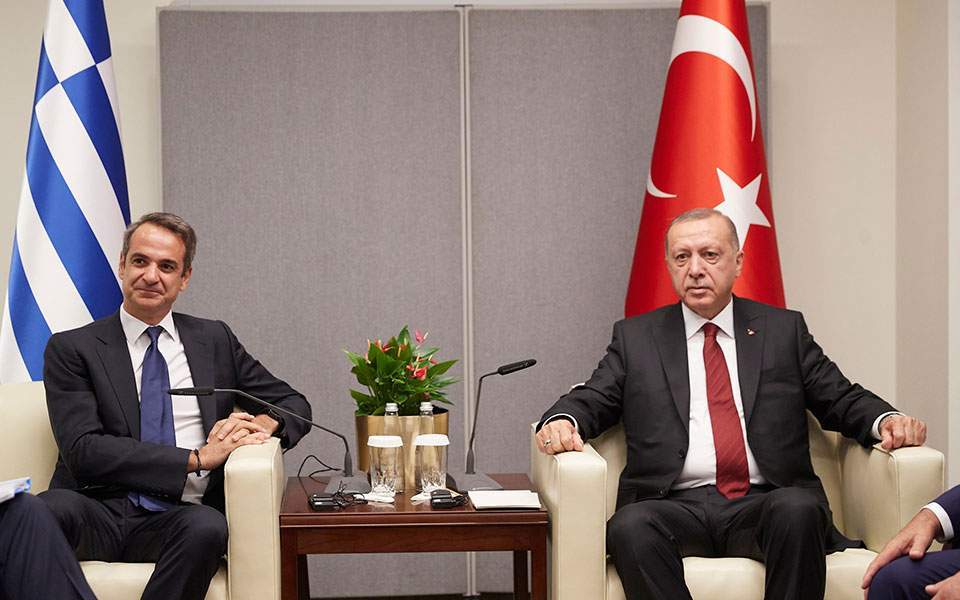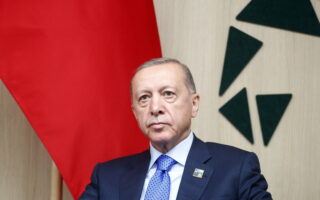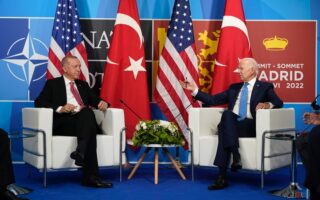The internationalization of Greek-Turkish affairs

The State Department official went one step further than his German colleague: “The United States is pleased with the meeting between the leaders of Greece and Turkey. We encourage these talks.” According to a Greek newspaper, the spokesperson then added that, for Washington, “Greek-Turkish normalization is a prerequisite for better Turkish-American relations.”
In Berlin’s official reaction to the Erdogan-Mitsotakis meeting, a connection between German relations with Ankara and bilateral Greek-Turkish affairs – diplomats refer to this as a “linkage” – is not to be found. Still, Berlin said it encourages the high-level diplomacy and added the politically relevant reminder that “the German side has worked intensively to reach such a dialogue.”
The official statements from Washington and Berlin demonstrate – and be it indirectly – the division of labor between America and Germany in the current phase of Greek-Turkish rapprochement. As it seems, Washington has left the diplomatic legwork, the day-to-day business of managing the relationship of the estranged allies, to Berlin. Thus, the Germans find themselves, once again, at the center of Western involvement. This, as we see these days, has been remarkably successful: Rarely have we witnessed this density of high-level and top-level Greek-Turkish meetings.
As it seems, Washington has left the diplomatic legwork, the day-to-day business of managing the relationship of the estranged allies, to Berlin
On December 7, Erdogan and Mitsotakis plan to take stock in person of the state of bilateral detente. Their meeting is scheduled to take place in Thessaloniki, a symbolic location for more than one reason. It will be interesting to see how the Turkish president will act in the birthplace of Mustafa Kemal in the year of the centenary of the Turkish Republic. Beyond the historical symbolism, the meeting in Greece’s northern metropolis has a political symbolism. After Vilnius and New York, both stages of international summit diplomacy of NATO and the United Nations, the Greek-Turkish process will be shifting to the region.
In essence, the issues that Ankara and Athens will negotiate in the coming weeks and months are bilateral, interstate matters. Nevertheless – and this explains the complexity – Greek-Turkish relations have always had an international dimension. Scholarly books dealing with the role of the “foreign factor” in the two countries’ relations fill libraries – and new publications are added every year.
The international involvement has two causes. First, it is the result of the foreign powers’ attempt to gain influence in the strategically important region. This has been the case in the past and will continue to be so in the future. Putin’s war against Ukraine has increased the geostrategic importance of Greece and Turkey. The second – no less important – factor in the “internationalization” of Greek-Turkish relations is the attempts of the governments in Athens and Ankara to attract support outside the region in the bilateral dispute.
The mobilization of political, diplomatic and military support against the “Turkish threat” has been a constant of Greek foreign policy in recent decades. The greatest – historic – success of this strategy has been Greece’s – and later Cyprus’ – accession to the European Union. The military alliances with the United States and France, and the strategic upgrading of cooperation with Israel, the UAE and Saudi Arabia contribute to the Greek government officials saying today that the country is in a better position vis-a-vis Turkey than ever before.
For Greek diplomacy, it can be seen as a success that Erdogan has ended his policy of provocations and returned to the negotiating table. The fact that this has happened is also a product of Western mediation.
In the actual negotiations, which are now being conducted at different levels, foreign powers play no role. Ankara is virtually allergic to interference by the EU, of which Turkey – unlike Greece and Cyprus – is not a member. Ankara would prefer to remove the Cyprus problem from the context of the United Nations. For Athens and Nicosia, that is out of the question.
For the government in Athens, joint recourse to the International Court of Justice seems to be the preferred method for resolving the dispute over sovereign rights in the Aegean and the Eastern Mediterranean. A concerted appeal to the international court would be the culmination of the internationalization of bilateral differences. It would put the decision on the “national question” in foreign hands.
In any case, this is a risky strategy with an open outcome. It proves that Greeks and Turks may not be able to solve their problems on their own. And are dependent on the help of foreign mediators.
Dr Ronald Meinardus is a senior research fellow and the coordinator of research projects on Greek-German relations at the Hellenic Foundation for European and Foreign Policy (ELIAMEP).





